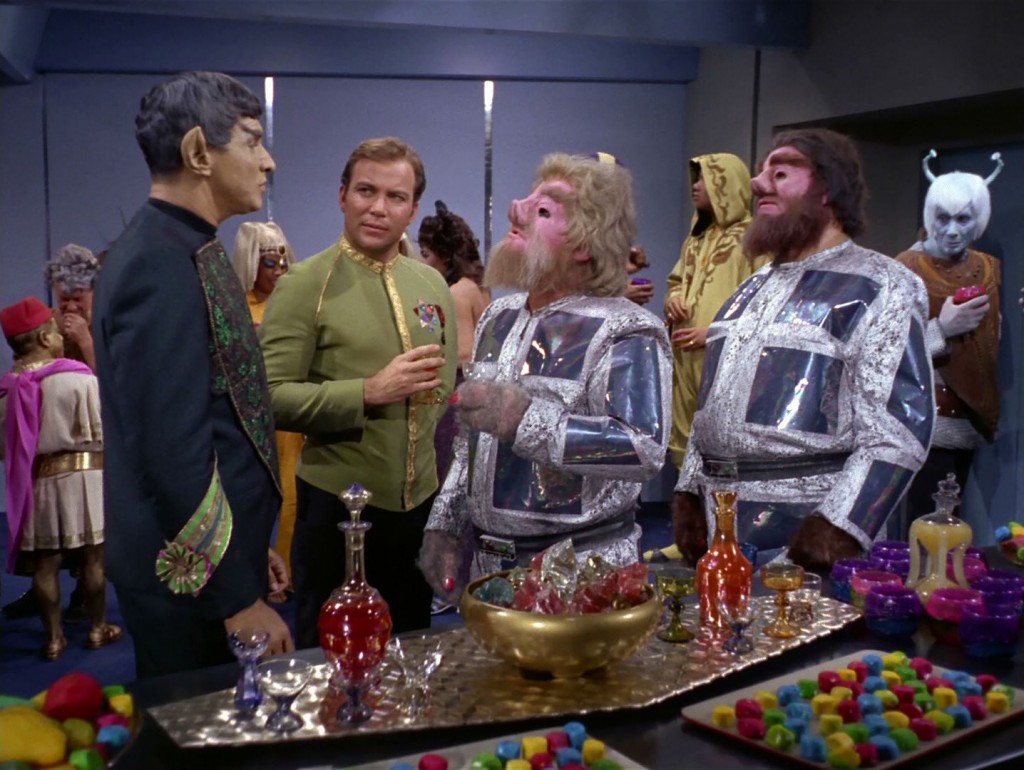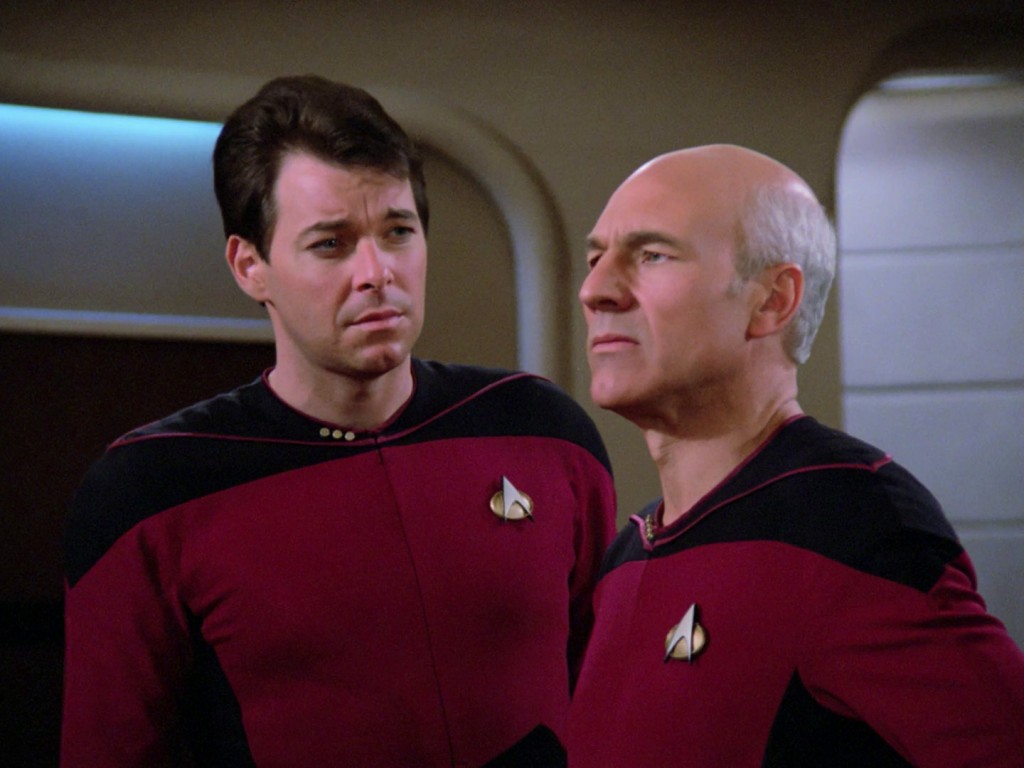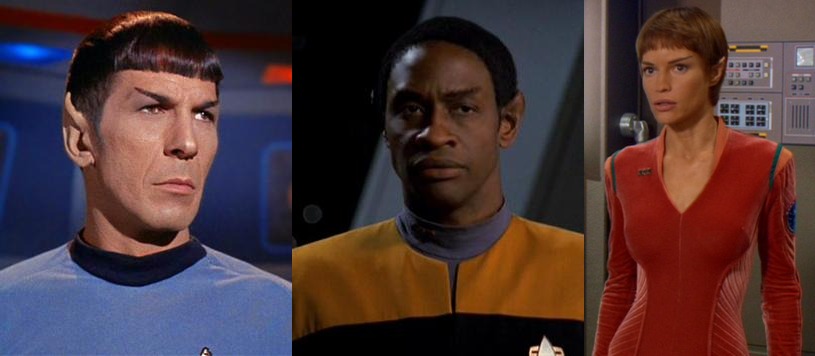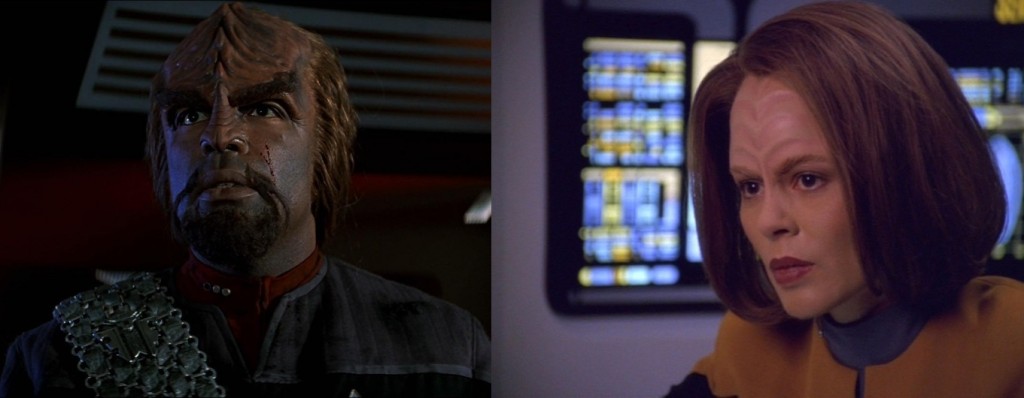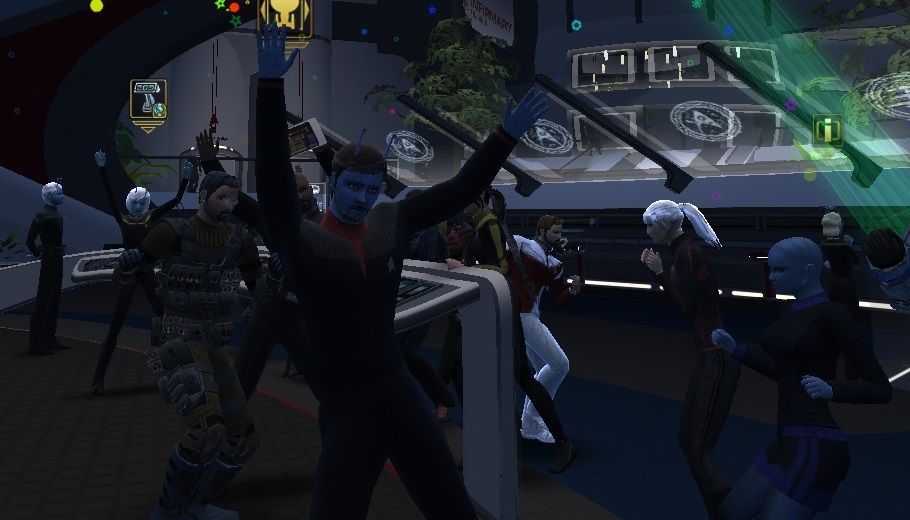Star Trek is an enormous and complex cultural entity whose impact on politics, technology, and storytelling are undeniable. It’s also as flawed and problematic as any other massive media franchise. Lifelong Trekkie and Deadshirt Editor-in-Chief Dylan Roth attempts to make sense of it all for die-hards and outsiders alike in his new column: Infinite Diversity.
“Do you want to know something? Everybody’s human.”
“I find that remark … insulting.”
– Captains James T. Kirk and Spock (Star Trek VI: The Undiscovered Country)
In the Star Trek fan community, it’s not uncommon to be asked to name your favorite alien race. The Trek universe is filled to the brim with imaginary cultures, whether they be franchise mainstays that get hours of attention or one-shot curiosities. It’s not uncommon to find a Trekkie/Trekker who “lives by Vulcan ideals,” for instance, and there are swaths of fans who meet up dressed as Klingons, armor, ribbed foreheads and all, to drink and sing songs in Klingon (which is an actual functioning language). Star Trek aliens are fun, but I was always puzzled when I got the question of “which one are you?” or “which would you want to be?” because the whole point of Star Trek is that you’re supposed to admire and emulate the human characters.
That might not be the most exciting answer, but it’s one hundred percent the one the show wants you to give. As I explained in the previous column, Star Trek is the story of a future humanity who’s moved beyond the selfishness, greed, and bigotry that holds us back from achieving peace and tranquility today. Most of the main characters in all five main crews are human, and they’re almost universally people of honor and integrity, fine examples to live up to. Many Trek series, particularly The Next Generation, feature the human-led crew traveling to alien worlds who haven’t reached that level of enlightenment, and the crew of the Enterprise (or Voyager, or occasionally the Defiant) have to help them solve some social problem, or even outright solve it for them.
The version of humanity portrayed in Star Trek isn’t perfect, but it’s often framed as if it is. Trek creator Gene Roddenberry wanted his human characters to have evolved past the traits that make us fight and hate each other, and he traced a lot of those traits back to greed and capitalism. With Star Trek he was able to envision a future where, through advanced technology, humanity is able to meet everyone’s needs at essentially no cost, making materialism obsolete and allowing individuals to seek meaning through self-improvement and exploration instead of the accumulation of wealth. Through the use of sci-fi technology, Roddenberry presented a dream in which we’d solved all of our economic problems, but he did it without having to actually present a plan for how to solve them. It’s not a society we could try to emulate and test, because we don’t have the science and probably never will, but we can imagine it working and that’s usually enough for the story to work.
Beyond just creating a culture where no one goes hungry, no one gets bored, and opportunity is truly equal (Is it though? A subject for another day.), Roddenberry imagined that after satisfying those survival needs that we’d be able to tackle and solve deep-seeded emotional problems. His humans have made peace with death. They no longer envy each others’ status or accomplishments. They don’t prejudge each other.
Each other. They haven’t quite moved past prejudging alien cultures, even if they say they have. Star Trek‘s humans like to boast how open-minded and accepting they are of everyone’s beliefs and customs, sometimes respecting them to insane, illogical lengths, but they definitely have a galactic-sized superiority complex. And in the context of the show, they absolutely should. While the humans are portrayed as peaceful, noble explorers who rarely give in to violence or fear, many alien cultures are either an overtly hostile enemy or a wildly imbalanced caricature of a single idea. It’s a storytelling shortcut that has some unfortunate implications.
Star Trek stories are often morality plays designed to be relevant to modern problems, and since humans in the future don’t have the same problems that we have, someone else has to play the role of the flawed audience. That’s ultimately what most aliens in Star Trek, especially early Star Trek, are for–they’re tailor-made cultures designed to tell a single story about how wrong they/we are about something. Want to tell a story about greed? Invent a super-greedy alien race to chastise. Want to condemn racism? Create a hyper-racist culture and force them to see the error of their ways.
It’s this kind of super-specialized culture creation that led to the proliferation of the “Planet of Hats” trope, where an alien culture is built upon a single defining trait and each individual in that culture has essentially the same goals and personality. It’s not uncommon to hear a species described as “a race of merchants” or “a race of warriors” or what have you, as if that’s the single vocation or attitude held by their entire planet’s population, and while that ought to come across as racist, the world of the show backs up these ridiculous generalizations at nearly every turn. Everybody on Sigma Iota II is a gangster. The planet Triannon is populated completely by religious zealots who hate each other. You’ll never run into a Nausicaan who isn’t a pirate or some other sort of brutish bully. When a species appears only once, there’s never any opportunity for their culture to get fleshed out, so they remain one-note, and this is done so many times that it seems as if half the galaxy is populated by “The Planet of Drug Addicts” or “The Mad Men Matriarchy Planet.”
There are a few dozen alien species who get a significant amount of screen time, however, who get to develop over time into more complex, unique cultures, and those tend to be the fan-favorites. Here’s a quick look at the two most popular examples:
Vulcans
The first extraterrestrials to appear in Star Trek (going all the way back to the original pilot, “The Cage,” produced in 1965), the Vulcans are the most established “good guy” aliens in the canon. Humanity’s most staunch ally and one of the four founding members of The United Federation of Planets, Vulcans are beloved mostly because of their standard-bearer Mr. Spock (played by Leonard Nimoy in his many Prime Universe appearances and by Zachary Quinto in the rebooted film series). Spock is arguably the most recognizable figure in Trek, more even than Kirk, because of his distinctive Vulcan characteristics: pointed ears, angled eyebrows, and bangs cut straight across the forehead.
Vulcans are most famous for abandoning emotion and using logic alone to guide their actions. While they could have come across as boring, uncomplicated robots, their culture is complicated by the revelation that Vulcans do have emotions, terribly powerful ones, in fact, but that they suppress and control them through fierce mental discipline and meditation. They do experience love, fear, anger, friendship, and loss, but they do their best not to express them, and to separate those feelings from the events that cause them, so that they can choose their response with their heads instead of their hearts. It’s an interesting and actually attainable lifestyle that many Star Trek fans have attempted to emulate, with various levels of success and weirdness.
At their best, Vulcans come across as a fairly well-realized culture, with many specific traditions and quirks that provide real texture. They’re a culture obsessed with probability and mathematics, but they also create and appreciate art and music, forms that are typically intended to evoke an emotional response. They have deeply-rooted spiritual traditions and rituals that are complicated by illogical pageantry, holdovers from the days when Vulcans were still violent, emotional people. They have telepathic abilities, but they’re used very rarely as the act of “mind melding” is considered very intimate.
What helps to make Vulcans feel more real and more interesting than most other Trek races is that they’re portrayed in a variety of ways, and that different Vulcan characters have very clear, distinctive personalities from one another. In The Original Series, we encounter Vulcans mostly through half-Human/half-Vulcan first officer Spock, who has a unique relationship to the culture as someone who was raised in it but never quite accepted by it, forcing him to overcompensate for his otherness and attempting to act as Vulcan as possible. Tuvok, Voyager‘s full-Vulcan security officer, is his own character, sharing Spock’s standoffish superiority (often played for laughs, like in TOS) but also more spiritual and less insecure. On Enterprise, science officer T’Pol starts off as a flat portrayal of the worst Vulcan stereotypes, but develops into a complex, conflicted character with her own unique struggles between logic and emotion. Even Vulcan guest stars often get to be their own people, not just clones of the popular Spock or flat, lifeless robots.
Klingons
If Vulcans are the classic “good guy” Trek aliens, then Klingons are the go-to antagonists, but they’ve actually appeared as allies to the Federation more often than as enemies. First appearing in “Errand of Mercy” (TOS) and featuring in every incarnation of Star Trek since, the Klingons are the alien culture we get to see not just the most frequently but in the most depth. The Klingons are depicted in a number of different ways throughout the life of the franchise, but TNG-era writer Ronald D. Moore best described them as a mixture of “the Samurai of feudal Japan, the Vikings, and the Hell’s Angels.”
A half-decade of Trek stories have given the Klingons a rich history and mythology, a fairly fleshed-out religion, and a complete, functioning language that you can actually study. Of the five live-action series, three of them have featured Klingons as a member of the ensemble (Worf on The Next Generation and Deep Space Nine, B’Elanna Torres on Voyager), providing ample opportunity to flesh out Klingons as individuals and as a culture. Like with the Vulcans, we’re treated to a pretty wide variety of Klingon characters, particularly because the Klingon Empire has played both hero and villain throughout the history of the franchise. Sometimes they’re framed as brutal enemies, sometimes they’re revered allies, but they’re almost always interesting.
If the Vulcans’ official mantra is “logic,” then the Klingons’ is “honor.” In their first iconic appearances in TOS, Klingons were violent, deceitful conquerors with little integrity, but over the course of the TOS film series they began to swap some traits with the Roman Empire-inspired Romulans, developing a code of honor that would often define them in future appearances. For many Klingons, loyalty is valued among all else, and they are willing to die to defend the glory of their ship or their house. At the same time, Klingons’ idea of honor doesn’t completely line up with ours, or even with each other’s. While some might consider it unspeakable to bear false testimony or to stab someone in the back, others are more Machiavellian, excusing any dishonest act by claiming “there is nothing more honorable than victory.”
Interestingly, the most central Klingon characters in Star Trek are both outsiders to Klingon society, making the audience’s entry point into the culture slightly separated. Worf was adopted by human parents as a young man and spent his adolescence in Russia before joining Starfleet, where he took great strides to hang onto the culture of his birth, but being the only Klingon around, created his own idea of what a Klingon should be around his own stoic, taciturn personality. B’Elanna Torres is half human, and likewise spent much of her life among humans being teased or prejudged for her race, internalizing that to the point that she started viewing her inherited Klingon traits (namely a hot temper) as weakness of character. It was only through guest starring characters that the audience would get an unfiltered look at what it really meant to be a Klingon raised among Klingons, which would often clash with our main characters’ own preferences or beliefs.
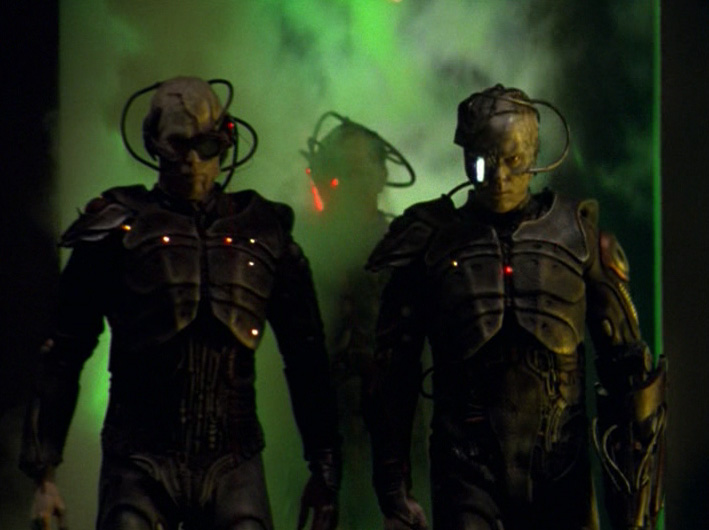
The Borg is a popular Trek race whose defining trait is their single-mindedness, and actually suffered from too much exposure and development.
Sometimes the roles the alien species are meant to play are more complex, and so rather than being based off of a particular social flaw or theme, they might take on the traits of a real-life political entity like The Soviet Union or Nazi Germany. On other occasions, aliens are meant to represent specific elements of the human psyche, which again can make them seem incomplete or unbalanced. Some, like the cybernetic zombies The Borg, embody our own culture’s fears, in their case the loss of identity and individuality. But in the end, they’re all based on us to a degree, in whatever simplified form the story demands.
That’s why, to me, it’s always been silly to idealize or emulate a Star Trek culture. It would be like deciding to honor only one side of yourself instead of perfecting the whole. Trek‘s humans are logical, they are honorable, they are steadfast and jovial and terse and united and individualistic all at once. The fact that they can be all of these things, and be better at each than we are now, may not make them terribly interesting characters, but it does make them icons to look up to, an ideal worth aspiring after. That, in the end, is what Star Trek is for.
…
Fine, fine, I’ll answer the goddamn question. I like the Andorians. They’re obsessed with repaying debts, they have cool antennae, and in the expanded universe they have four genders and I think that’s pretty cool. Happy now?
Infinite Diversity will return in two weeks! Follow @DeadshirtDotNet on Twitter to keep up with what’s new here on Deadshirt, and feel free to tweet @DylanRoth with suggestions for future topics for Infinite Diversity, or just to talk about Trek. He truly never gets tired of that.

